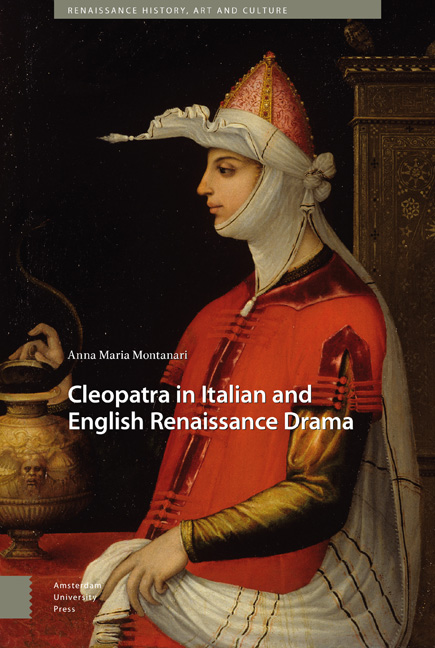Book contents
- Frontmatter
- Dedication
- Epigraph
- Contents
- List of Illustrations
- A Note on the Cover
- List of Abbreviations
- Acknowledgements
- Introduction
- 1 ‘No Humble Woman She’
- 2 ‘The Subject of Talk the World Over’
- 3 The Egyptian Queen's Rebirth
- 4 The Great Theatre of Cleopatra
- 5 ‘The Wanton Luxurie of Court’
- 6 ‘A Lass Unparalleled’
- Conclusion
- Bibliography
- Index
5 - ‘The Wanton Luxurie of Court’
Published online by Cambridge University Press: 21 November 2020
- Frontmatter
- Dedication
- Epigraph
- Contents
- List of Illustrations
- A Note on the Cover
- List of Abbreviations
- Acknowledgements
- Introduction
- 1 ‘No Humble Woman She’
- 2 ‘The Subject of Talk the World Over’
- 3 The Egyptian Queen's Rebirth
- 4 The Great Theatre of Cleopatra
- 5 ‘The Wanton Luxurie of Court’
- 6 ‘A Lass Unparalleled’
- Conclusion
- Bibliography
- Index
Summary
Abstract
Étienne Jodelle's Cleopatre captive. Garnier's Marc Antoine (1578). Mary Sidney, countess of Pembroke's Antonius – a translation of Garnier’s Marc Antoine – and the distinctive traits of her work. Analysis of Daniel’s Cleopatra. Daniel's A Letter from Octavia to Marcus Antonius, a poem in ottava rima on the same subject. Samuel Brandon's The Virtuous Octavia (1598) and the two letters accompanying the tragicomedy. The dichotomy between adulterous Cleopatra and chaste Octavia are chiefly repurposed within texts written by Renaissance women (for instance, Cary's Mariam).
Keywords: Garnier; Mary Sidney; Daniel; Brandon; Cary
From Cleopatra to Cléopâtre
In the winter of 1553 Cleopatra first spoke French, at the Hôtel de Reims in Paris, in Étienne Jodelle's Cleopatre captive. Thus the queen of Egypt became the first heroine of French tragédie humaniste. The play was performed in the presence of Henri II and of the duke of Guisa. The occasion was the celebration of the victory of Metz, against Charles V, and the marriage of Diane d’Angoulême to Orazio Farnese. The event was praised by Ronsard and the other poètes de la Pléiade.3 Jodelle (1532-1573) was at the time an avant-garde twenty-year-old poet.
The shift from one country to another was not without consequence. P.R. Horne has summarised thus the formal differences between Italian and French dramas:
Early French tragedy was much more narrowly academic than Italian tragedy of the same period; more tightly bound by classic rules, which the French theorists themselves made more restrictive. The subjects considered suitable for tragedy were the narrowest possible; and of the action chosen a minimum was actually shown on the stage. A tragedy depended for its effect on its rhetorical qualities […] and the whole play was more lyrical than dramatic.
The translation also implied a passage from the shattered reality of the Italian signorie and republics to the wider horizons of national monarchies. The historical background was completely different, too. France was on the verge of its Wars of Religion (1562-1598) and Jodelle, who would later write anti-Protestant sonnets, in his play spares neither Roman Catholics nor Huguenots. The imminent storm induces him to an antireligious position which would have been unthinkable after 1562.
- Type
- Chapter
- Information
- Cleopatra in Italian and English Renaissance Drama , pp. 175 - 210Publisher: Amsterdam University PressPrint publication year: 2019



